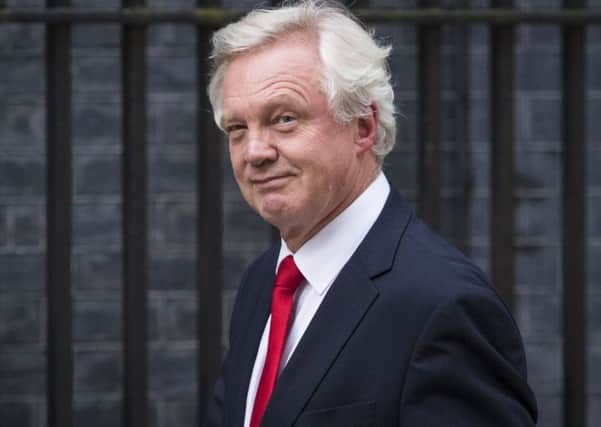David Davis pushing EU to abandon Brexit talks timetable


Brexit Secretary David Davis will arrive in Brussels today urging European negotiators to show “flexibility and imagination”, with UK government sources having criticised the EU’s terms for talks.
The renewed talks come after Labour signalled a significant shift in the party’s Brexit policy, saying that it would support remaining in the EU single market and customs union for a transition phase of up to four years.
Advertisement
Hide AdAdvertisement
Hide AdLabour’s shadow Brexit secretary Keir Starmer suggested his party could even support permanent continued membership of the single market and customs union after Brexit, provided that free movement rules were overhauled.
The announcement makes the politics of driving Brexit through parliament even more difficult for Prime Minister Theresa May, whose minority government now faces the possibility of a House of Commons majority for staying in the single market.
Meanwhile, the Scottish Government called on UK ministers to finally rule out the “unthinkable” prospect of a “no deal” exit from the EU.
Mrs May and her Cabinet have softened their stance in the past year, distancing themselves from her rhetoric that “no deal is better than a bad deal”, but the government has refused to rule out walking away from talks.
Scottish Brexit minister Michael Russell said: “More and more people across business and in our communities are expressing their concern at the damage being done to our economy and public services.
“This is no time for brinkmanship. By ruling out a ‘no deal’ outcome, at least some of that damage can be limited.”
He also pressed the UK government to reconvene the Joint Ministerial Committee on EU negotiations in order to “fully engage with devolved administrations”.
The EU has insisted that progress must be made on key aspects of the withdrawal deal, including the UK’s “divorce bill”, expat citizens’ rights and the Irish border, before there is any talk of future arrangements for crucial issues such as trade.
Advertisement
Hide AdAdvertisement
Hide AdTime is running out to break the deadlock on those issues, with leaders of the 27 remaining EU states set to decide in October whether the divorce talks have got far enough to allow them move on to the next phase.
Mr Russell added: “The clock is ticking, yet we are running out of time to ensure we have transitional and longer-term arrangements to protect, as much as possible, the interests of Scotland, the UK and the EU.”
He called for an inter-governmental committee on Brexit bringing together ministers from the UK, Scotland and Wales to be reconvened.
Scottish and Welsh first ministers Nicola Sturgeon and Carwyn Jones last week renewed their warning to oppose vital legislation to enact Brexit unless it hands more powers to devolved administrations.
There is hope for a compromise this week on one key stumbling block, following the publication of a position paper that suggests the UK would be willing to sign up to European Free Trade Association (Efta) court. The court enforces judgements of the European Court of Justice (ECJ) in a handful of non-EU trading partners that are not under the ECJ’s direct jurisdiction.
Arriving at the European Commission’s Brussels HQ to open talks, Mr Davis is expected to call for Brexit negotiations to be broadened.
“For the UK, the week ahead is about driving forward the technical discussions across all the issues,” he will say.
“We want to lock in the points where we agree, unpick the areas where we disagree, and make further progress on a range of issues.
Advertisement
Hide AdAdvertisement
Hide Ad“But in order to do that, we’ll require flexibility and imagination from both sides.”
Mr Davis is expected to add: “Our goal remains the same. We want to agree a deal that works in the best interests of both the EU and the UK, and people and businesses right across Europe.
“And we’re ready to roll up our sleeves and get down to work once more.”
A UK government source earlier warned Brussels not to “drag its feet” in discussions, which must be completed by the end of the two-year negotiating period in March 2019.
“This round of negotiations will focus on thrashing out the technical detail on important matters related to us leaving the EU, and will act as a stepping stone to more substantial talks in September,” the source said.
“The UK has been working diligently to inform the negotiations in the past weeks, and has published papers making clear our position on a wide range of issues from how we protect the safe flow of personal data, to the circumstances around Ireland and Northern Ireland.
“Now, both sides must be flexible and willing to compromise when it comes to solving areas where we disagree.
“As the EU itself has said, the clock is ticking so neither side should drag its feet.”
Advertisement
Hide AdAdvertisement
Hide AdEuropean sources hit back at suggestions that the timetable for talks, which was agreed unanimously by all 27 EU member governments, was delaying the Brexit process.
One EU official was quoted as saying that if Mrs May wanted to change the terms, she would have to visit European capitals one by one and make her case.
“If May wants to build bridges, she needs to start a shuttle diplomacy offensive,” an unnamed official told a Sunday newspaper.
EU chief negotiator Michel Barnier responded to a number of new Brexit position papers from the Department for Exiting the EU papers by tweeting that he was “looking forward” to discussing them, but that the “essential” issue was to make progress on citizens’ rights, the financial settlement and Ireland.
EU negotiators are understood to be frustrated at the UK government’s refusal to set out their proposals for calculating the final financial settlement with the EU, which some have estimated could come to about £50 billion-£80bn.